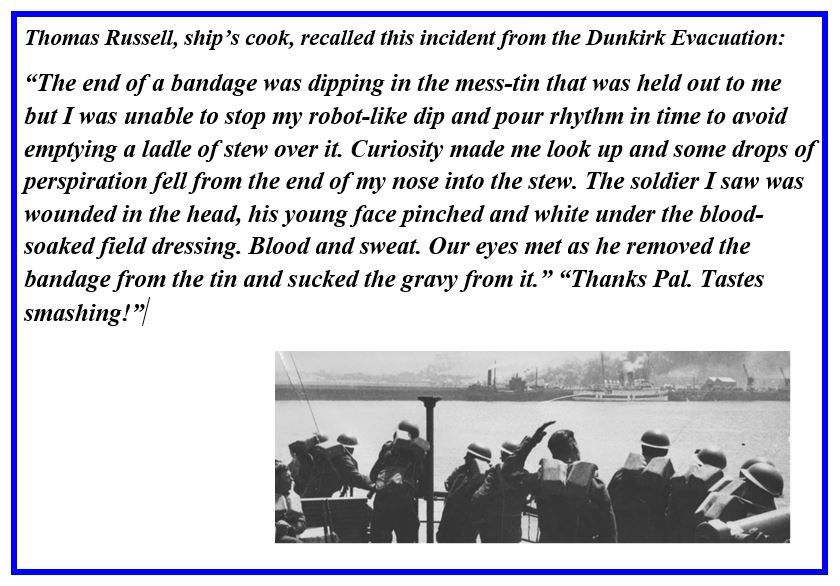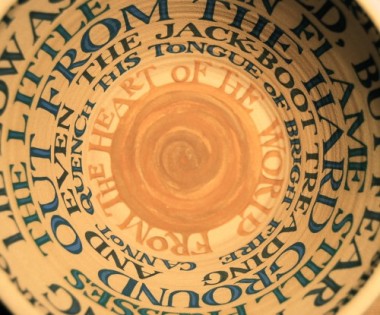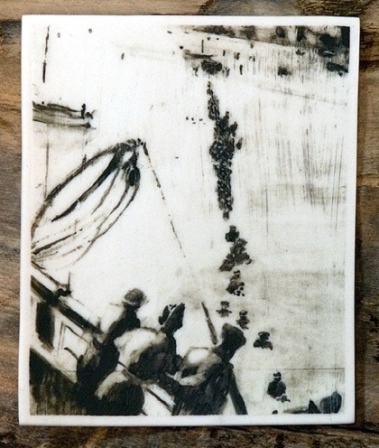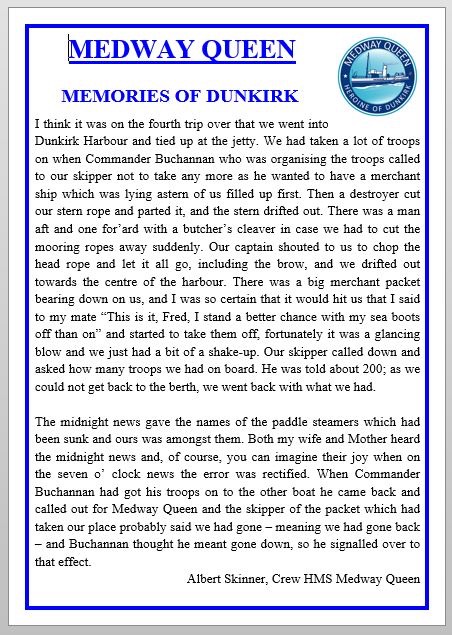
About an hour after the setting of the sun came the familiar drone, as the Luftwaffe came along and dropped flares, so they could see us. The sky was alight as they dropped their bombs. Where the boats came in, there was a little nucleus at the head of the water, and then a great queue, running up from the dunes behind, perhaps a quarter of a mile long. The idea was just like a London bus queue. Nobody told us to do that – it seemed the decent thing to do.
There must have been about ten or twelve of these queues running up. When we were halfway up in our queue, the bombing started, and one man ran to the head of the queue when he saw a boat coming. A naval officer turned on him and said, ‘Look, go back to the place you’ve come from – or I’ll shoot you.’ He said it very loudly for everybody to hear, and the man went back with his tail between his legs.
When we got on board, an officer came round and said, ‘We shall shortly be sailing for Blighty – England, Home and Beauty.’ I went down into the hold, where I was put into a hammock, because I was dead – we all were.
(Captain Anthony Rhodes, 253 Field Company Royal Engineers, from Max Arthur’s Forgotten Voices)
In the account of this day, Sunday 2nd June, something must be written of the loss of Commander Clouston, RN, who had for six days been doing noble service on the jetty at Dunkirk. On the Saturday night he returned to Dover to report upon the situation and to receive final orders for the great lifting of troops planned for Sunday night. He left Dover on Sunday in a motor-launch with a naval officer and some seamen. A second motor-launch came with them. On their way back to Dunkirk they were attacked by enemy aircraft, who put his motor-launch out of action and left her in a sinking condition. Commander Clouston waved to the men in the second launch to get away before they were sunk. Soon afterwards, this second boat was hit. Commander Clouston refused to desert his men, clinging round the wreck of their boat.
With the naval officer who was ultimately the only survivor of his Company, he then left his wrecked launch to try to swim to a boat seen a couple of miles away. Becoming weary long before he could reach this boat he turned to swim back to the water-logged launch, and was never seen again. His companion, after swimming for two or three hours, reached the boat he had sighted and with great difficulty got on board her. She proved to be a ship’s deserted cutter. In this he drifted for some time till picked up by a French trawler which had lost her way in the Channel. He undertook to navigate this trawler back to Ramsgate, and did so, reporting at Dover dressed in clothes borrowed from a French sailor.
Commander Clouston had been of the utmost service in helping the escape of nearly two hundred thousand men under frightful conditions of strain and danger. It was a grief to many that he did not live to see the lifting brought to an end.
(John Masefield, Nine Days Wonder)
Even though they must have known that the end was near, they never grumbled, nor were they afraid; they even went so far as to ask permission of Commander Clouston before removing their tin hats. When I left them clinging around the wreck, although already suffering from exposure, they were singing and discussing old times together. Commander Clouston’s example must have helped them all, as it helped me. Although exhausted himself, he continued to chat, encourage and white lie to the end.
(The account of the naval officer who survived, from Hugh Sebag-Montefiore’s Dunkirk)
Sylvia, a motor yacht, was crewed by her civilian owner, who on his return with a full load of men said ‘I have seen the sea red with human blood, severed arms and legs, a sight I shall never forget. If she goes down, I shall go with her.’ He refuelled and went straight back to Dunkirk, returning the next day with another full load of men and a completely crippled boat.
(Ships’ stories from several sources including the website of the Association of Little Ships of Dunkirk. More little ships’ stories throughout the nine days)

Louie comes agog. Her brother Harry [West] came back on Monday. It pours out – how he hadn’t boots off for 3 days; the beach at Dunkirk – the bombers as low as trees – the bullets like moth holes in his coat – how no English aeroplanes fought. At Dunkirk many men shot themselves as the planes swooped, Harry swam off, a boat neared. ‘Say Chum can you row?’ ‘Yes’, he said, hauled in, rowed for 5 hours, saw England, landed – didn’t know if it were day or night or what town – didn’t ask – couldn’t write to his mother – was despatched to his regiment. He looted a Belgian shop & stuffed his pockets with rings which fell out in the sea; but 2 watches pinned to his coat survived. He saw his cousin dead on the beach; & another man from the street. He was talking to a chap, who showed him a silk handkerchief bought for his joy lady. That moment a bomb killed him. Harry took the handkerchief. Harry has had eno’ war, & is certain of our defeat – got no arms & no aeroplanes – how can we do anything?
(Virginia Woolf’s diary. More about Harry West tomorrow, 3rd June)
Sheila Parish, a FANY driver, remembers driving ambulances to fetch the survivors of HMS Arcadia, sunk by a U-boat in the retreat from Dunkirk, the four hundred aboard her singing ‘Roll out the barrel’ as they drowned. ‘The men who survived were in a terrible state, their bodies and clothers burned with flaming oil when they jumped into the sea.’
(Sheila Parish, FANY, from Anne de Courcy’s Debs at War)
I was stationed at Plymouth for Dunkirk and was told to go and meet some boats coming in, on one of which was King Zog of Albania and his family, and take him to London. I took the biggest car I could find, set off and found the King with his sisters and his baby son on the quayside. He told me that he would accompany his men in the lorry containing his crates of luggage and that we should meet at the railway station. There I took him to the ticket office to buy tickets for his group of sixty and he was asked for the requisite sum of money. He said: ‘I have no money at all.’ The ticket collector said: ‘Well, if you’ve no money you can’t travel.’ The King turned and ordered some of his men to open one of the crates. From it, he picked out great handfuls of jewels and handed them to the ticket collector. The poor man was horrified, but he let them travel.
(Sheila Parish, FANY, from Anne de Courcy’s Debs at War)
Earlier on the morning of 2nd June, hospital staff at the 12th Casualty Clearing Station [the Chateau] were woken by what Major Philip Newman described as ‘a terrific crash’. A shell had hit the front room of the Chateau, the former operating theatre, injuring about a dozen of ‘the poor chaps’ whom Newman found there. ‘Everywhere patients were yelling.’
Newman took the chance to tell General Alexander about the ‘hopeless’ situation at the chateau. Alexander immediately had a message sent to Ramsey in Dover asking for hospital ships. Unfortunately, though the message was sent en clair [ie not in code] in the hope that the Germans would intercept it, and would not bomb ships on a mercy mission, the two hospital ships which attempted to reach Dunkirk later that day were both attacked. One sank, the other returned, damaged, to England.
(from Hugh Sebag-Montefiore’s Dunkirk. More on Philip Newman and the fate of the wounded in the Chateau tomorrow, 3rd June)
2nd June. We set off once more [on the Royal Daffodil]… and were attacked by six enemy aircraft. I had previously seen the Paris sunk. I saw the German aeroplanes machine-gunning the boats which contained nurses and medical personnel. The six enemy aircraft flew over us and dropped six aerial torpedoes.
Five of these missed, but the sixth hit the ship, passed through three decks, entered the engine room, and went out through the starboard side before exploding just clear of the ship. The engines stopped and the aeroplanes machine-gunned the ship with tracer bullets, which started small fires. The ship began to make water through the hole made by the bomb and listed to starboard. Gear was shifted to the port side and the port boats were lowered to the deck and filled with water. This raised the starboard side enough to lift the hole just clear of the water.
Mr J Coulthard, the chief engineer, and Mr W Evans, the second engineer, took all the beds they could find and used them to plug the hole. Mr Evans stood up to his neck in the water in the engine-room holding open the bilge-valve while Mr Coulthard kept the pumps going. With a diesel-engine ship this was a great risk; but the Royal Daffodil managed to get back to Ramsgate, running very slowly with three parts of water to one of oil in the system, and was able to land all the troops she had taken on board.’
(Altogether in seven days at Dunkirk the Royal Daffodil carried off 8000 troops. Captain G Johnson’s account of these truly heroic deeds at Dunkirk is in the IWM archive; the last part of this account is from AD Divine’s Dunkirk, Sunday June 2nd, where he continues:)
It is difficult to speak too highly of this feat. The sheer seamanship of it is beyond praise. To lift the ship’s side clear out of the water needed determination and courage of a high order. The bravery of her engineers who, with the almost pathetic inadequacy of mattresses and planks, staunched that great hole in her side is superb.
(AD Divine was at Dunkirk on this day on board White Wing, a 30-foot river cruiser, with Rear-Admiral Taylor. His account was written ‘at the time’:)
Having the Admiral on board, we were not actually working the beaches but were in control of operations. After we had spent some time putting small boats in touch with their towing boats, the battery off Nieuport began to drop shell on us. It seemed pure spite.
A salvo of shells got one of our troopships alongside the Mole. She was hit clean in the boilers and exploded in one terrific crash. There were about 1000 Frenchmen on the Mole. We had seen them crowding along its narrow crest, outlined against the flames. They had gone out under shell-fire to board the boat, and now they had to go back again, still being shelled. It was quite the most tragic thing I have ever seen in my life. We could do nothing with our little dinghy.
While they were still filing back to the beach and the dawn was breaking with uncomfortable brilliance, we found a navy whaler. We told her people to come aboard, but they said that there was a white motor-boat aground and they would have to fetch off her crew. They were terribly slow, and we waited. It was my longest wait, ever. When they found the captain of the motor-boat, they stood and argued with him and he wouldn’t come off anyway. Damned plucky chap.
(from AD Divine’s Dunkirk. That captain eventually got his motor-boat Singapore refloated on the rising tide and left with three French officers in addition to his crew and some British soldiers they found ‘floating around’, plus three lifeboats in tow, which they found mid-Channel.)

The calmness of the average non-military citizen is magnificent. Although on the day of Leopold’s capitulation [King Leopold III’s surrender of Belgium to the Germans precipitated the necessity for the BEF’s retreat and the whole Dunkirk scenario] a German wireless commentator painted a colourful picture of London as a panic-stricken city, the truth was considerably less picturesque. Once over the shock, Londoners sensibly forgot Leopold and thought only of the men he’d left behind him, fighting an heroic rearguard action to cover the retreating troops’ movements. Then, after a seemingly interminable period of suspense, it was learned that the first war-stained, exhausted contingent had arrived safely on British shores, and the relief and enthusiasm were terrific.
No one seems to think much beyond these arrivals at the moment. It isn’t yet known how many haven’t come back.
(Mollie Panter-Downes, 2nd June 1940, from one of her Letters from London for The New Yorker, published in London War Notes.)
Tired, half-clad, often with their clothes saturated through having to wade out to the rescuing steamers, the Army returns. More heroism and more ingenuity are exercised over this haphazard evacuation than over any other in the history of the world. If the peace of Europe had been sought with half this energy, war would have been eliminated ten or more years ago. A batch of the rescued, marching through Waterloo station, are cheered until the glass roof rings with the sound.
(Vera Brittain, England’s Hour)
The one thing I shall never forget, though – the picture that will always haunt me – was the look in the faces of the men while we were filling up another boatload. Would there be room for them in this lot – or – ? You could see anxious eyes counting the heads in front and calculating chances. Then, as we paddled away, loaded to the gunnel, the face of the man left at the head of the queue – the man who had just missed – grinning resolutely, and wishing us luck, and wondering in his heart if we should be able to manage another trip!
(Ian Hay, volunteer seaman, from his account in the Imperial War Museum archive)
Many soldiers were still struggling to reach Dunkirk, Lt. Julian Fane and Corporal Eldridge among them. ‘It was only at dawn on 2 June, after four nights on the run, that they finally reached the first of the canals running round the Dunkirk perimeter. On the far side, there was a scuttled boat that had not quite sunk. After Corporal Eldridge had swum across and brought it back. They set up a kind of ferry service, with men clinging to the half-submerged boat, while it was pulled back and forth across the canal with string. They were only just in time.’
(Lt. Julian Fane and Corporal Eldridge, Glosters, from Hugh Sebag-Montefiore’s Dunkirk.)
On either side, scattered over the sand in all sorts of positions, were the dark shapes of dead and dying men, sometimes alone, sometimes in twos and trees. No assistance that availed anything could be given to these dying men. The living themselves had nothing to offer. They just pressed forward to the sea, hoping that the same fate would not be theirs.
There was still another dread haunting us. Should we be able to get off the beach before dawn discovered us, and those waves of German bombers that we had watched the previous day diving over Dunkirk had us for a target?
“I’m not too comfortable in my mind about things,” Boyd muttered to me.
We came at last to the water’s edge.
“I don’t like the look of the Mole,” said the Major. “You saw the shelling going on at the land end. They know it’s packed with troops waiting to be taken off. It’s sure to get a bad time. Shall we try to get off from the beach? Wade into the water and take our chance in one of the queues?”
We tacked ourselves on to the rear of the smallest of the three queues, the head of which was already standing in water up to the waist. Half an hour passed. Suddenly a small rowing boat appeared. The head of the queue clambered in and were rowed away into the darkness. We moved forward, just stood there silently staring into the darkness, praying that a boat would soon appear.
(from Return via Dunkirk by Gun Buster, whose ordeal finally ends tomorrow, 3rd June. His comrade Boyd, master of the understatement, was BG Bonallack, author of The Retreat, the poem I set on Thames to Dunkirk. More on BG ‘Boyd’ Bonallack here.)

Nurse Nancy Harker, who we met on 27th May in Calderstone’s hospital in Lancashire for the wounded from Dunkirk was still in ‘a long-drawn-out nightmare. The stench of gangrene still comes back to me.’ She also remembered how ‘the wounds that cried out for immediate treatment had to wait for days.’ Her favourite Dunkirk survivor was Bert Heath, whose right leg had been amputated in France, due to gunshot wounds, and his right arm had to go too as soon as he reached Calderstone’s. He quickly won over Nurse Harker by nicknaming the leg’s stump ‘Baby’ and by promising her that as soon as he was given a ‘peg leg’, he would race her up and down the ward. She was less sympathetic to three Frenchmen who arrived on stretchers only to leap up as soon as they were inside to declare that they had been shamming to get away. Although they may well have lived through traumas every bit as dreadful as those haunting the British wounded, they were sent to Coventry by the nurses and abandoned in the laundry cupboard. ‘No time for them,’ wrote Nurse Harker in her account. ‘Only saw them when I went to get linen.’
(Nancy Harker’s story from Hugh Sebag-Montefiore’s Dunkirk)
The Soldier’s Death
Trail all your pikes, dispirit every drum,
March in a slow procession from afar,
Be silent ye dejected Men of War!
Be still the hautboys, and the flute be dumb!
Display no more, in vain, the lofty banner;
For see! where on the bier before ye lies
The pale, the fall’n, the untimely Sacrifice
To your mistaken shrine, to your false idol Honour.
(Anne Finch, Countess of Winchilsea, 1661 – 1720)
To read the comments or add to this day’s conversations and contributions, please go to 2nd June 1940 – Tatter’d colours in the menu top left, and you’ll find the comments at the foot of the page.
Tomorrow, 3rd June – Towards the end


